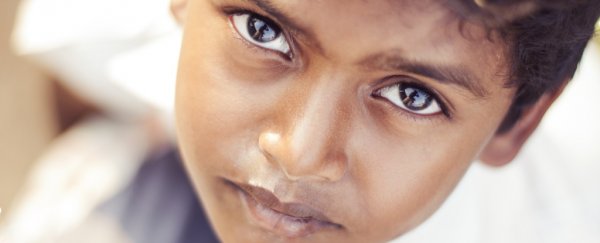They had been lost – presumed dead, or even worse – for unimaginable lifetimes, be it weeks, months, or years.
But for thousands of children who vanished in the streets, alleyways, and slums of India, it only took days to identify the missing, in a new experimental trial of facial recognition technology by New Delhi police.
Using a photographic database of some 60,000 missing children and comparing them against approximately 45,000 images of unidentified orphans in care institutions throughout the city, 2,930 children were recognised by the pilot program's facial recognition software (FRS).
In a virtual blink of an eye – four days, to be exact, the time it took the FRS to make its matches between April 6-10 – almost 3,000 lives were given a chance to be put back on track, with efforts now reportedly underway to reunite these lost children with their families.
It's an amazing result, highlighting how this emerging technology could help to heal a vast and devastating social problem endemic to India, and one which seems insurmountable without the assistance of FRS algorithms.
"India currently has almost 200,000 missing children and about 90,000 lodged in various child care institutions," activist Bhuwan Ribhu from child welfare group Bachpan Bachao Andolan – which helped develop the trial – explained to The Better India.
"It is almost impossible for anyone [to] manually go through photographs to match the children."
Ribhu's organisation began the project as a better way of sifting through the vast amount of records held in TrackChild, the national Indian database of missing children.
Realising that facial recognition could help speed things up, Bachpan Bachao Andolan intervened, securing an order from the Delhi High Court to make the TrackChild database available to police, who used their FRS system to analyse thousands of images.
"If such a type of software helps trace missing children and reunite them with their families, nothing can be better than this," the chairperson of India's National Commission for Protection of Child Rights, Yashwant Jain, told the Press Trust of India.
Following the success of the New Delhi trial, suggestions have been made that TrackChild data could become available to other state police forces attempting to track down missing children – and it's possible TrackChild could be overhauled so FRS can be run on its image databases internally.
All of these are welcome developments, but it's early days yet, and nobody's saying the predicament of India's vanishing children has been solved just yet.
For the many thousands of children who go missing in India every year, the reasons behind their disappearances can be complex, violent, and ugly.
Some children are abducted on the street, to be sold into prostitution or child labour. Others run away from their parents – sometimes due to abuse at home.
Some families are said to sell their children, or intentionally lead unwanted daughters astray in crowded places.
Of course, some children simply get lost the old-fashioned way, through circumstances and very bad luck – like Saroo Brierley, whose dramatic life story became the subject of the 2016 film Lion.
When he was a very young boy, Brierley lost his older brother in a train station. He fell asleep on a train, and wasn't able to escape the carriage until it had transported him almost 1,500 kilometres (930 miles) across India. He was so young he didn't know the name of his hometown, so could never find his way back.
It took some 25 years before he was ultimately reunited with his biological mother – providing a long-awaited happy ending to a tale of heartbreak and misery, and one which is disturbingly commonplace among young people in India.
Hopefully these new FRS innovations enable a wave of similar reunions, and families that once became separated can come together again.
